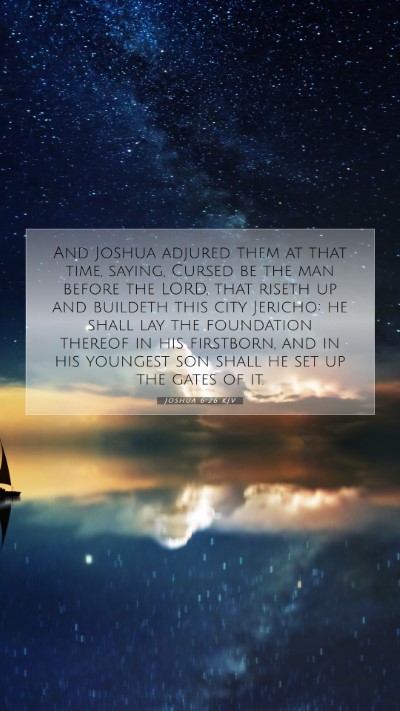Bible Verse Commentary: Joshua 6:26
The verse Joshua 6:26 states, "And Joshua adjured them at that time, saying, Cursed be the man before the LORD, that riseth up and buildeth this city Jericho: he shall lay the foundation thereof in his firstborn, and in his youngest son shall he set up the gates of it."
This declaration by Joshua serves as a profound warning and holds significant implications within the broader context of Scripture. Below is a summarized interpretation based on the insights from public domain commentaries including Matthew Henry, Albert Barnes, and Adam Clarke.
Contextual Background
This statement is made after the fall of Jericho, a pivotal moment in Israel's conquest of Canaan. The destruction of Jericho was not only a military victory but also a demonstration of God’s power. Joshua’s curse highlights the seriousness of God's commands and the consequences of disobedience.
Meaning and Interpretation
-
Divine Curses and Consequences: Matthew Henry emphasizes that such a curse pronounced by Joshua signifies the displeasure of God against those who would defy His will. The rebuilding of Jericho would symbolize a blatant disregard for the command of God, which had declared Jericho accursed.
-
The Seriousness of God's Commands: According to Albert Barnes, this verse illustrates a broader principle within Scripture: when God gives specific commands, there are dire consequences for those who choose to ignore them. By pronouncing a curse on anyone who would rebuild Jericho, Joshua upholds the sanctity of God’s orders.
-
Generational Impact: Adam Clarke notes the haunting implications of this curse affecting future generations. The phrase, “he shall lay the foundation thereof in his firstborn,” indicates that such disobedience would come at a terrible personal cost, suggesting that the sins of the father could carry over to the children.
-
A Symbol of Spiritual Warfare: The destruction of Jericho and the curse pronounced upon its future restoration can be seen as metaphorical of the spiritual warfare believers face. It represents the battle against sin and the importance of remaining faithful to God's direction.
-
A Call to Obedience: This curse can be interpreted as a call for the Israelites to remain steadfast in their commitment to God, as they were on the brink of conquering the promised land. It served as a warning to heed God's commandments strictly.
Application of the Verse
For modern readers, this verse prompts reflection on the significance of obedience to God's will. In applying this scripture to daily life, believers are encouraged to recognize the weight of their actions and decisions, understanding that they bear responsibility for their choices, not just for themselves, but potentially for future generations.
Cross References
- Deuteronomy 13:12-16 - regarding curses on those who turn others away from the Lord.
- 1 Kings 16:34 - where the curse on Jericho's rebuilder is fulfilled.
- Hebrews 11:30 - which mentions the faith of Israel in the fall of Jericho.
Conclusion
In summary, Joshua 6:26 serves as a stark reminder of the importance of diligence in obeying God’s commands. Commentaries highlight its implications not only in the immediate historical context but also in the spiritual lives of believers today. Such insights foster a deeper understanding of the gravity of Scripture and encourage ongoing Bible study, reflection, and obedience to God's will.
Further Study Resources
For those interested in delving deeper into the meaning of this verse and others like it, consider engaging in Bible study groups, utilizing Bible study tools, and exploring various Bible study guides that focus on scriptural analysis and application.


